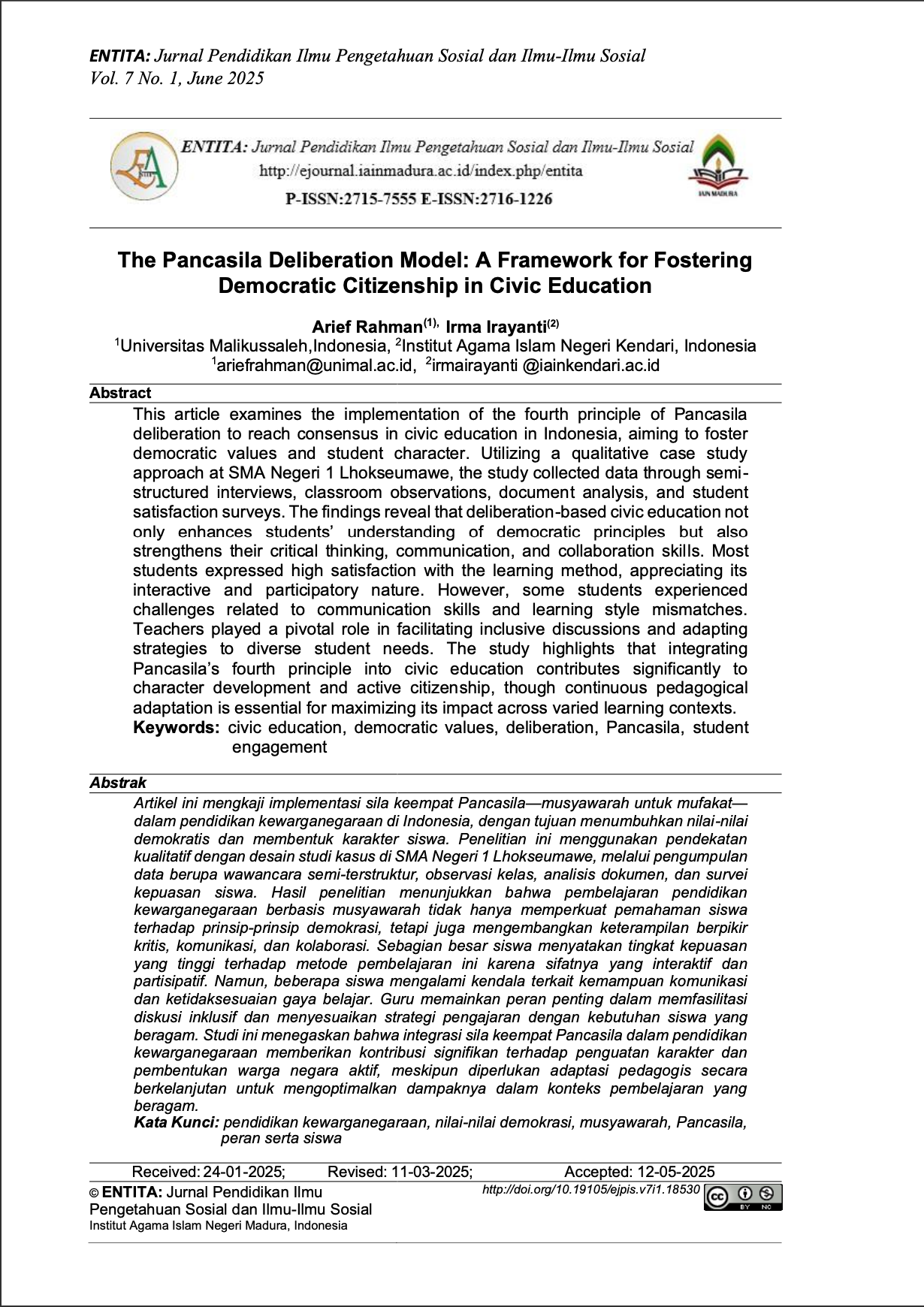The Pancasila Deliberation Model: A Framework for Fostering Democratic Citizenship in Civic Education
 Abstract views: 422
,
Abstract views: 422
,
 PDF downloads: 344
PDF downloads: 344
Abstract
This article examines the application of the fourth principle of Pancasila—deliberation to reach consensus—in civic education in Indonesia, aiming to cultivate democratic values and student character. The research employs a qualitative approach through a case study design, utilizing semi-structured interviews, classroom observations, and document analysis at SMA Negeri 1 Lhokseumawe. Findings indicate that most students appreciate the deliberation-based learning methods, although challenges such as communication barriers and varying learning styles persist. The role of teachers is crucial in facilitating active participation and creating an inclusive learning environment. The implications of this research highlight the need for continuous adaptation of teaching strategies to address diverse student needs, thereby enhancing the effectiveness of civic education and fostering responsible, engaged citizens.
Downloads
References
Ainscow, M., & Miles, S. (2008). Making education for all inclusive: Where next? Prospects, 38(1), 15–34. https://doi.org/10.1007/s11125-008-9055-0
Akram Awla, H. (2014). Learning Styles and Their Relation to Teaching Styles. International Journal of Language and Linguistics, 2(3), 241. https://doi.org/10.11648/j.ijll.20140203.23
Alalwan, N. (2022). Actual use of social media for engagement to enhance students’ learning. Education and Information Technologies, 27(7), 9767–9789. https://doi.org/10.1007/s10639-022-11014-7
Bundick, M. J., Quaglia, R. J., Corso, M. J., & Haywood, D. E. (2014). Promoting student engagement in the classroom. Teachers College Record, 116(4), 1–34.
Carter, N., Bryant-Lukosius, D., Dicenso, A., Blythe, J., & Neville, A. J. (2014). The use of triangulation in qualitative research. Oncology Nursing Forum, 41(5), 545–547. https://doi.org/10.1188/14.ONF.545-547
Creswell, J. W., & Poth, C. N. (2016). Qualitative inquiry and research design: Choosing among five approaches. Sage publications.
Denig, S. J. (2004). Multiple Intelligences and Learning Styles: Two Complementary Dimensions. Teachers College Record, 106(1), 96–111. https://doi.org/10.1111/j.1467-9620.2004.00322.x
Dewantara, J. A., Suhendar, I. F., Rosyid, R., & Atmaja, T. S. (2019). Pancasila as Ideology and Characteristics Civic Education in Indonesia. International Journal for Educational and Vocational Studies, 1(5), 400–405. https://doi.org/10.29103/ijevs.v1i5.1617
Farwati, S., Iskhak, M., & Nunu Mahnun. (2023). Integrating Pancasila in Character Education: A Qualitative Analysis of Ethical Values for Nation-Building. HEUTAGOGIA: Journal of Islamic Education, 3(2), 211–223. https://doi.org/10.14421/hjie.2023.32-06
Goodman, B., Linton, F., & Gaimari, R. (2016). Encouraging Student Reflection and Articulation Using a Learning Companion: A Commentary. International Journal of Artificial Intelligence in Education, 26(1), 474–488. https://doi.org/10.1007/s40593-015-0041-4
Hermans, H. J. M., & Bartels, R. (2020). Citizenship Education and the Personalization of Democracy. In Citizenship Education and the Personalization of Democracy. Routledge. https://doi.org/10.4324/9781003031116
Johnson, D. W., & Johnson, R. T. (2006). Peace education for consensual peace: the essential role of conflict resolution 1 . Journal of Peace Education, 3(2), 147–174. https://doi.org/10.1080/17400200600874792
Madung, O. G., & Mere, W. S. (2021). Constructing Modern Indonesia Based on Pancasila in Dialogue with the Political Concepts Underlying the Idea of Human Rights. Journal of Southeast Asian Human Rights, 5(1), 1–24. https://doi.org/10.19184/jseahr.v5i1.20258
Mahardhani, A. J., Cahyono, H., & Chaniago, Z. (2024). The Urgency of Pancasila and Citizenship Education to Strengthen National Character with Global Citizenship Dimensions. AL-ISHLAH: Jurnal Pendidikan, 16(4).
Mardones, R. (2020). The Politics of Citizenship Education in Chile. The Palgrave Handbook of Citizenship and Education, 343–357. https://doi.org/10.1007/978-3-319-67828-3_35
Mickovska-Raleva, A. (2019). Civic Education for Democratic Citizens: To What Extent Do Civic Education Curricula and Textbooks Establish Foundations for Developing Active Citizens in the Republic of Macedonia?. Journal of Social Science Education, 18(3), 108–126.
Naeem, M., Ozuem, W., Howell, K., & Ranfagni, S. (2023). A Step-by-Step Process of Thematic Analysis to Develop a Conceptual Model in Qualitative Research. International Journal of Qualitative Methods, 22, 16094069231205788. https://doi.org/10.1177/16094069231205789
Nieto, S. (2015). The light in their eyes: Creating multicultural learning communities. Teachers College Press.
Priya, A. (2021). Case Study Methodology of Qualitative Research: Key Attributes and Navigating the Conundrums in Its Application. Sociological Bulletin, 70(1), 94–110. https://doi.org/10.1177/0038022920970318
Sackstein, S. (2017). Peer Feedback in the Classroom: Empowering Students To Be the Experts. In Ascd. Ascd. https://www.amazon.com/Peer-Feedback-Classroom-Empowering-Students/dp/1416623663
Santoso, G., Abdulkarim, A., Sapriya, S., Maftuh, B., & Murod, M. (2023). Citizenship Education Perspective: Strengths, Weaknesses, And Paradigm of the Curriculum in 2022. https://doi.org/10.4108/eai.15-9-2022.2335929
Sleeter, C. E. (2014). Multiculturalism and education for citizenship in a context of neoliberalism. Intercultural Education, 25(2), 85–94. https://doi.org/10.1080/14675986.2014.886357
Sternberg, R. J. (2000). The Theory of Successful Intelligence. Gifted Education International, 15(1), 4–21. https://doi.org/10.1177/026142940001500103
Tri Wahyuni, D., & Negeri, S. (2024). Pancasila Education as One of the Forms of National Character in the Global Era. Research Horizon, 4(1), 17–24.
UNESCO. (2007). Education for Sustainable Development: Linking Learning and Happiness. http://www2.unescobkk.org/elib/publications/146_147/ESD_Hapiness 2007_web.pdf
Utami, N. S., & Putri, K. K. A. (2023). Implementation of the values of Pancasila in the Indonesian State system. International Journal of Social Science Research and Review, 6(3), 1–5.

Copyright (c) 2025 Entita: Jurnal Pendidikan Ilmu Pengetahuan Sosial dan Ilmu-Ilmu Sosial

This work is licensed under a Creative Commons Attribution-NonCommercial 4.0 International License.
ENTITA: Jurnal Pendidikan Ilmu Pengetahuan Sosial dan Ilmu-Ilmu Sosial operates an Open Access policy under a Creative Commons Non-Commercial 4.0 International license. Authors who publish with this journal agree to the following terms:
- The copyright of the received article once accepted for publication shall be assigned to the journal as the publisher with licensed under a

- Journal is able to enter into separate, additional contractual arrangements for the non-exclusive distribution of the journal's published version of the work (e.g., post it to an institutional repository or publish it in a book), with an acknowledgement of its initial publication in this journal.
- Journal is permitted and encouraged to post their work online (e.g., in institutional repositories or on their website) prior to and during the submission process, as it can lead to productive exchanges, as well as earlier and greater citation of published work (see The Effect of Open Access).
- Here is Copyright Transfer Form that author can download and send to OJS during submission.
















